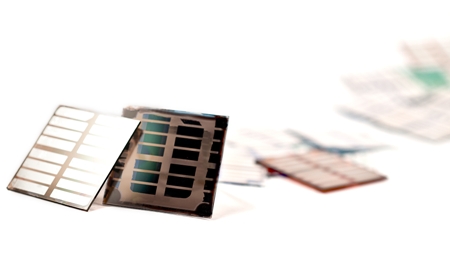The Interuniversity Microelectronics Centre (IMEC), Polyera and Solvay have achieved a record 8.3% efficiency for organic solar cells having inverted device architecture.
 Organic solar cell with inverted device architecture and 8.3% efficiency
Organic solar cell with inverted device architecture and 8.3% efficiency
The cost of solar power is becoming on-par with conventional sources of energy, including oil, nuclear and coal-derived power. The cost-competitiveness will further increase with more reduction in installation expenses and manufacturing costs of solar panels. Organic solar cells can be manufactured on flexible and lightweight substrates such as textiles or plastics, and at high-throughput on large areas. These cells have the potential to reduce both installation and transportation costs. Organic solar cells can be integrated into various things and locations such as windows, facades and even clothes due to their optical translucency.
The 8.3% efficiency is a world record for single junction organic solar cells that are based on polymers and possess inverted device stack architecture. IMEC had developed the inverted bulk heterojunction architecture for solar cells that are polymer-based. The proprietary architecture increases the stability of the devices and also optimizes the management of cell light.
Polyera’s proprietary semiconductor in a photoactive layer was used along with the imec architecture to achieve the certified world record conversion efficiency of 8.3% for inverted polymer cell architectures. When compared to standard architectures, inverted device architectures possess significant commercially-relevant benefits. The results of this collaboration have proved the commercial viability of scalable inverted device architectures in different types of polymer materials. Further improvements in increasing the lifetime and size of cells will be a part of future efforts.